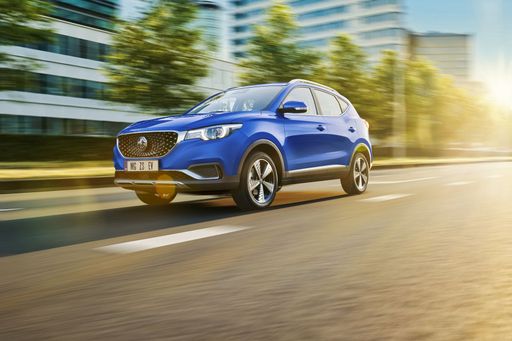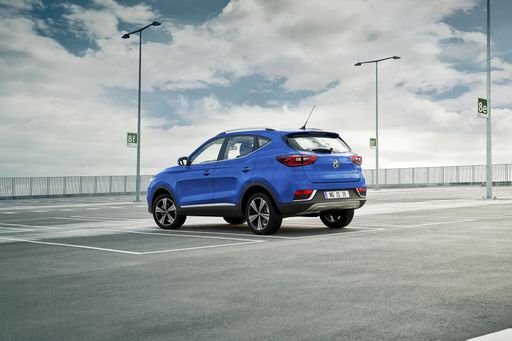MG ZS vs Nissan Leaf - Differences and prices compared
Compare performance (197 HP vs 217 HP), boot space and price (18000 £ vs 30800 £ ) at a glance. Find out which car is the better choice for you – MG ZS or Nissan Leaf?
Costs and Efficiency:
Looking at overall running costs, both models reveal some interesting differences in everyday economy.
MG ZS has a convincingly advantage in terms of price – it starts at 18000 £ , while the Nissan Leaf costs 30800 £ . That’s a price difference of around 12780 £.
Engine and Performance:
Under the bonnet, it becomes clear which model is tuned for sportiness and which one takes the lead when you hit the accelerator.
When it comes to engine power, the Nissan Leaf has a hardly perceptible edge – offering 217 HP compared to 197 HP. That’s roughly 20 HP more horsepower.
In acceleration from 0 to 100 km/h, the Nissan Leaf is distinct quicker – completing the sprint in 6.90 s, while the MG ZS takes 8.70 s. That’s about 1.80 s faster.
In terms of top speed, the MG ZS performs barely noticeable better – reaching 168 km/h, while the Nissan Leaf tops out at 157 km/h. The difference is around 11 km/h.
There’s also a difference in torque: Nissan Leaf pulls significantly stronger with 340 Nm compared to 148 Nm. That’s about 192 Nm difference.
Space and Everyday Use:
Beyond pure performance, interior space and usability matter most in daily life. This is where you see which car is more practical and versatile.
Both vehicles offer seating for 5 people.
In curb weight, MG ZS is slightly lighter – 1330 kg compared to 1580 kg. The difference is around 250 kg.
In terms of boot space, the MG ZS offers to a small extent more room – 443 L compared to 394 L. That’s a difference of about 49 L.
In maximum load capacity, the MG ZS performs significantly better – up to 1457 L, which is about 667 L more than the Nissan Leaf.
When it comes to payload, MG ZS a bit takes the win – 470 kg compared to 415 kg. That’s a difference of about 55 kg.
Who wins the race in the data check?
The Nissan Leaf shows small but noticeable advantages in the objective data comparison.
This result only shows which model scores more points on paper – not which of the two cars feels right for you.
Costs and Consumption
View detailed analysis
Engine and Performance
View detailed analysis
Dimensions and Body
View detailed analysis

Nissan Leaf
MG ZS
The MG ZS arrives as a cheeky and practical choice for shoppers who want SUV style and family-friendly space without blowing the budget. It may not pretend to be premium, but with sensible equipment, easy-to-live-with driving manners and surprising value, it makes a persuasive case for anyone after sensible transport with a bit of personality.
details




Nissan Leaf
The Nissan Leaf is a practical, easygoing electric hatch that turns daily commutes into a quiet, effortless affair while offering more cabin space than it lets on. It’s a sensible, wallet-friendly step into electrification for buyers who value comfort and simplicity over sporty drama, though those chasing long-distance thrills might look elsewhere.
details



Costs and Consumption |
|
|---|---|
|
Price
18000 - 24000 £
|
Price
30800 - 37200 £
|
|
Consumption L/100km
5 - 6.5 L
|
Consumption L/100km
-
|
|
Consumption kWh/100km
-
|
Consumption kWh/100km
16.7 - 17.8 kWh
|
|
Electric Range
-
|
Electric Range
270 - 385 km
|
|
Battery Capacity
-
|
Battery Capacity
39 - 59 kWh
|
|
co2
113 - 145 g/km
|
co2
0 g/km
|
|
Fuel tank capacity
41 L
|
Fuel tank capacity
-
|
Dimensions and Body |
|
|---|---|
|
Body Type
SUV
|
Body Type
Hatchback
|
|
Seats
5
|
Seats
5
|
|
Doors
5
|
Doors
5
|
|
Curb weight
1330 - 1420 kg
|
Curb weight
1580 - 1756 kg
|
|
Trunk capacity
443 L
|
Trunk capacity
385 - 394 L
|
|
Length
4430 mm
|
Length
4490 mm
|
|
Width
1818 mm
|
Width
1788 mm
|
|
Height
1635 mm
|
Height
1540 - 1545 mm
|
|
Max trunk capacity
1457 L
|
Max trunk capacity
790 L
|
|
Payload
375 - 470 kg
|
Payload
384 - 415 kg
|
Engine and Performance |
|
|---|---|
|
Engine Type
Full Hybrid, Petrol
|
Engine Type
Electric
|
|
Transmission
Automatic, Manuel
|
Transmission
Automatic
|
|
Transmission Detail
Automatic Gearbox, Manual Gearbox
|
Transmission Detail
Reduction Gearbox
|
|
Drive Type
Front-Wheel Drive
|
Drive Type
Front-Wheel Drive
|
|
Power HP
116 - 197 HP
|
Power HP
150 - 217 HP
|
|
Acceleration 0-100km/h
8.7 - 12.5 s
|
Acceleration 0-100km/h
6.9 - 7.9 s
|
|
Max Speed
168 km/h
|
Max Speed
144 - 157 km/h
|
|
Torque
148 Nm
|
Torque
320 - 340 Nm
|
|
Number of Cylinders
4
|
Number of Cylinders
-
|
|
Power kW
85 - 145 kW
|
Power kW
110 - 160 kW
|
|
Engine capacity
1495 - 1498 cm3
|
Engine capacity
-
|
General |
|
|---|---|
|
Model Year
2024 - 2025
|
Model Year
2019
|
|
CO2 Efficiency Class
C, E
|
CO2 Efficiency Class
A
|
|
Brand
MG
|
Brand
Nissan
|
What drive types are available for the MG ZS?
The MG ZS is available as Front-Wheel Drive.
